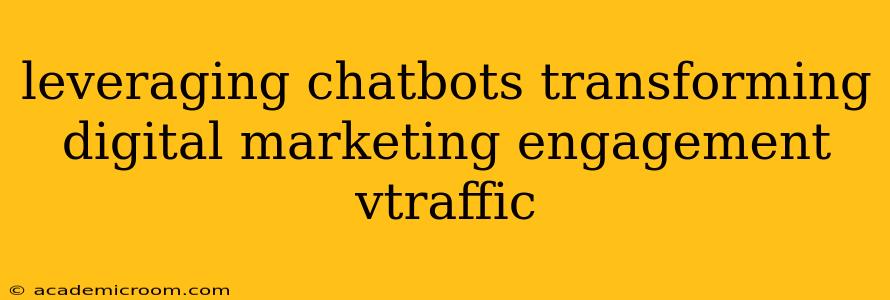The digital marketing landscape is constantly evolving, and businesses need to adapt quickly to stay ahead of the curve. One of the most transformative technologies currently reshaping how businesses engage with their audience and drive traffic is the chatbot. No longer a futuristic novelty, chatbots are becoming indispensable tools for streamlining operations, enhancing customer experience, and ultimately, boosting the bottom line. This article delves into how businesses can leverage chatbots to transform their digital marketing engagement and drive significant traffic increases.
What are Chatbots and How Do They Work?
Chatbots are computer programs designed to simulate human conversation. They use artificial intelligence (AI) and natural language processing (NLP) to understand user queries and provide relevant responses. This interaction can take place across various platforms, including websites, social media, messaging apps (like WhatsApp and Facebook Messenger), and even in-app communication. Essentially, they act as 24/7 virtual assistants, handling customer inquiries, providing support, and guiding users through the sales funnel. Sophisticated chatbots can even learn from past interactions, improving their accuracy and effectiveness over time.
How Chatbots Transform Digital Marketing Engagement
Chatbots offer several significant advantages in boosting engagement and improving the overall digital marketing strategy:
-
24/7 Availability: Unlike human agents, chatbots are available around the clock, instantly responding to customer queries and providing support regardless of time zone or business hours. This immediate responsiveness dramatically improves customer satisfaction and reduces wait times.
-
Personalized Experiences: By leveraging user data and AI, chatbots can deliver personalized interactions, recommending products, services, or content tailored to individual preferences. This level of personalization enhances engagement and increases conversion rates.
-
Improved Customer Service: Chatbots can handle a large volume of routine inquiries, freeing up human agents to focus on more complex issues. This leads to faster resolution times and improved customer service overall.
-
Lead Generation: Chatbots can proactively engage website visitors, qualifying leads based on pre-defined criteria and gathering valuable information such as contact details and preferences. This streamlines the lead generation process and improves sales pipeline efficiency.
-
Increased Conversion Rates: By guiding users through the sales funnel, answering their questions, and providing relevant information, chatbots can significantly increase conversion rates. They can also facilitate seamless transactions and streamline the purchasing process.
How Chatbots Drive Traffic
While chatbots primarily improve engagement, their indirect impact on driving traffic is substantial:
-
Enhanced SEO: By providing high-quality, informative content through chatbot interactions, businesses can indirectly improve their SEO rankings. The data collected from chatbot interactions can also provide valuable insights for content optimization.
-
Social Media Engagement: Chatbots can be integrated with social media platforms, enhancing engagement and driving traffic to the business's website or other online properties.
-
Email Marketing Integration: Chatbots can collect email addresses and segment audiences, facilitating more targeted and effective email marketing campaigns, which in turn drive website traffic.
-
Improved Website Navigation: Chatbots can guide users through a website, making it easier for them to find the information they need. This improved navigation contributes to a better user experience and can reduce bounce rates.
What are the different types of chatbots?
There are primarily two types of chatbots:
-
Rule-based chatbots: These chatbots follow a pre-defined set of rules and can only respond to specific keywords or phrases. They are simpler to implement but have limited capabilities.
-
AI-powered chatbots: These chatbots use machine learning and natural language processing to understand and respond to a wider range of user inputs. They are more complex but offer significantly more advanced capabilities, including personalization and learning.
How much do chatbots cost?
The cost of implementing a chatbot varies widely depending on several factors including complexity, features, and integration requirements. Simple rule-based chatbots can be relatively inexpensive, while sophisticated AI-powered chatbots may require a larger investment.
Are chatbots effective for small businesses?
Yes, chatbots are increasingly effective for small businesses as they offer a cost-effective way to improve customer service, increase engagement, and drive traffic without the need for a large support team.
What are the best platforms for building chatbots?
Several platforms offer user-friendly interfaces for building chatbots, including Dialogflow, ManyChat, Chatfuel, and others. The best platform will depend on the specific needs and technical expertise of the business.
By integrating chatbots strategically into their digital marketing efforts, businesses can significantly enhance customer engagement, optimize their sales funnels, and ultimately drive more traffic to their online platforms. The key is to choose the right chatbot solution and tailor it to meet the specific needs of your target audience and business objectives. The future of digital marketing is conversational, and chatbots are leading the way.
